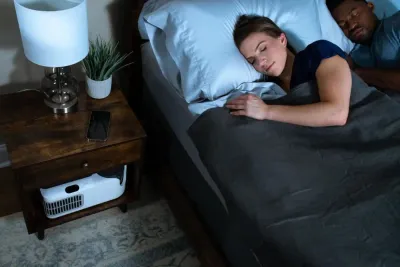What Are The Benefits of Sleeping in Cooler Temperatures?
Chilipad Editorial Team • Mar 06, 2024

Key Takeaways
Sleeping in a cooler environment helps your body fall asleep faster, stay asleep longer, and move more efficiently through deep and REM sleep by supporting natural temperature regulation.
- Cooler temperatures help your body recognize it’s time to wind down, which can make it easier to fall asleep and stay asleep.
- Staying cool through the night supports deeper sleep cycles and may reduce those annoying middle-of-the-night wakeups.
- Cold sleep can activate brown fat, which may help boost metabolism and support calorie burn.
- A cold bedroom supports natural hormone production, including melatonin and growth hormone, which play key roles in sleep, immune health, and overall well-being.
In recent years, we have all tried to take specific measures to live a healthy lifestyle. Whether it's eating better, exercising more, or drinking more water, our days are focused on being healthier overall. But making healthy decisions doesn't have to stop once you go to sleep.
Getting a full night's sleep doesn't only help you feel more energized and rested when you wake up, but it also benefits your mind, weight, and, most importantly, your heart.
Though the health benefits of sleeping cold are significant, according to the CDC’s national sleep data, roughly 44% of Americans report a restful night's sleep almost every night. [1]
Ideal Sleep Temperature for Adults
The best temperature for sleep is around 65 degrees Fahrenheit (18.3ºC), although it can vary slightly from person to person. [2]
This temperature range helps your body naturally regulate its temperature throughout the night, promoting deeper sleep cycles.
Aim for a thermostat setting between 60 and 68 degrees Fahrenheit (15.6 and 20 degrees Celsius) as a good starting point to discover your ideal sleep comfort zone.
Let our Chilipad Dock Pro, our best cooling mattress topper, or Cube, our original mattress pad, help lower your body temperature so you can sleep more deeply and wake up refreshed.
Save Up to 20% & Unlock Cooler Sleep
Cooling the entire room is not always practical. A bed cooling system lets you control sleep temperature directly where it matters most. Shop our sale and save! Easily heat or cool your mattress to 55°F-115°F.
How Cooler Temperatures Improve Sleep Quality
Although several factors can affect how you sleep, 69% of people reported that sleeping in a cool room enhances their ability to sleep well.
The CDC reported that 35% of adults in the US sleep less than seven hours per night on average. [3] If you're one of the individuals with difficulty falling asleep, we've listed some health benefits of why you should sleep cold.
Hot Sleeper Study: Studies suggest that anywhere from 10 to 40 percent of individuals experience night sweats or sleep in hot environments. [4]
How Cooler Temperatures Help You Fall Asleep Faster
As evening approaches, our body temperature decreases naturally, alerting our body it's time to slow down and rest. If the room temperature is too hot, it can potentially stop that signal (it's time to sleep) and postpone falling asleep. Because the room is too hot, you may also notice restless sleep.
As you fall asleep, cooler temperatures help you acquire deeper sleep, sleep faster, increase the quality of REM sleep, and lower the risk of metabolic diseases like diabetes.
In a Harvard study, participants were likely to fall asleep faster, taking an average of 6.2 minutes when their body temperature decreased at its lowest (approx. 97.7ºF/36.5ºC). It took participants 20 minutes to fall asleep when they were warmer (98-99.5ºF/37-37.5ºC). [5]
A Japanese sleep society study reported an intervention that lowered the core body temperature of participants by approximately 1ºF (0.5-0.6ºC). [6] This resulted in a remarkably shorter time to fall asleep (average 8.9 minutes) by polysomnography, the gold standard in sleep studies.
Ideal Sleep Temperature for Adults: Sixty-nine percent of people reported that sleeping in a cool or cold room also affects their ability to get quality sleep. [7]
How Body Temperature Plays a Role in Sleep
Cooler temperatures at night play a crucial role in enhancing the quality of your sleep. Your core temperature drops leading up to bedtime and increases naturally, preparing you to wake up. However, "sleep hot" can cause havoc on the quality of your sleep.
Keeping your room and your body cool improves your overall sleep quality. The ideal sleeping temperature ranges between 60 to 68 degrees, and during those temperatures, it stimulates the production of melatonin, promoting sleep.
When your bedroom is at a lower temperature, it assists your body in this natural cooling, making it easier to fall into a deep and restful sleep. Essentially, by having a cool room, you're working with your body's own sleep mechanics, not against them, leading to more rejuvenating sleep.
Get Better Sleep: Our mattress cooling system leverages water's amazing thermal powers for deep, restorative sleep.
In the Japanese sleep study mentioned earlier, participants reported that sleeping cooler greatly improved their overall sleep quality. They noted sleeping longer, waking up fewer at night, and falling asleep faster. [8]
Sleep Study: According to a study published in the Journal Sleep Medicine, participants who slept in a cool room (around 60-67 degrees Fahrenheit) reported better quality sleep compared to those who slept in a warmer room (around 75 degrees Fahrenheit). [9]

Cooler Sleep Fights Insomnia
Specific types of insomnia are believed to have ties to body temperature irregularities, suggesting the evening temperature drop is delayed or the morning increase is advanced.
Although definitive evidence is unavailable, sleep hygiene specialists recommend keeping the temperatures cool as it may help treat insomnia naturally.
Large meals or even a fever pose problems for sleep if your core temperature is elevated.
Why a Cool Room Improves Deep Sleep
Deep sleep is an essential stage of the sleep cycle that promotes physical and mental restoration. During this stage of sleep, your body and brain waves slow down, and waking up from this stage is more challenging. If you do wake up, you may feel groggy.
Cooler sleeping conditions have been found to be conducive to deeper, more restorative sleep stages. When your body is in a cold environment, it can help facilitate the transition into deep sleep and maintain it for longer periods.
Note: As the temperature drops, opening a window can bring in fresh cold air to help cool down your indoor environment for better sleep.
This is because cooler temperatures promote the release of melatonin. This hormone regulates sleep and helps your core body temperature decrease, which is necessary for initiating and maintaining deep sleep.
It's important to note that while cooler sleeping conditions can enhance deep sleep, it is just one factor among many that contribute to a good night's rest. Other factors such as sleep hygiene, managing stress, and having a comfortable sleeping environment also significantly optimize the quality of your sleep.
To learn more about enhancing the quality of your deep sleep, visit How to Get More Deep Sleep.
Tip: Create a sleep routine: Try reading a book, listening to relaxing music, or sitting in a warm bath.
Increase Natural Melatonin Levels
Sleeping in a cold room at night may decrease your body's core temperature quicker, naturally boosting melatonin, the sleep hormone. A nightly decrease in body temperature relates to a rise in melatonin levels. These shifts tell the body that it's time to sleep while you regulate your body's sleep cycle.
Interestingly, much-cited literature indicated that the body-temperature-lowering effects of melatonin are reduced with age and the luteal phase of the menstrual cycle. [10] So, sleeping colder may help those who are in those certain groups.
An increased melatonin level helps you stay asleep throughout the different stages of sleep. Additionally, it can help produce cancer-fighting properties, enhance your mood, and improve brain health.
Enhance Hormonal Balance and Well-being
Maintaining a cool temperature in your surroundings can do wonders for your body's hormonal regulation. Cold sleep promotes the natural balance and production of essential hormones, such as melatonin and growth hormone.
These hormones play a crucial role in regulating sleep, immune function, metabolism, and overall well-being. By supporting their natural regulation, you can promote better health and experience improved energy levels, mood, and cognitive function.
So, if you want to optimize your hormonal balance and overall health, keeping a cool and comfortable temperature in your environment can greatly help.

How a Cool Bedroom Increases Metabolism
Sleeping in a colder room significantly affects your metabolism. How? Your body burns what is known as "brown fat" (considered "good" fat, unlike white fat) so that you can generate heat while you sleep at colder temperatures.
Research suggests that turning the thermostat down to 66ºF at bedtime could potentially burn an additional 100 calories over the course of 24 hours of sleep.
Sleeping in a cooler environment (around 66 degrees Fahrenheit) can increase metabolism and improve insulin sensitivity, which may help prevent diabetes. [11]
How to Stay Cool While Sleeping?
Getting a good night's sleep is essential for your physical and mental health, but it can be challenging when feeling hot and uncomfortable. If you sleep hot, sleeping in a cooler room can help improve your sleep quality and overall well-being. However, it can be difficult to maintain a comfortable and ideal temperature throughout the night.
If you're a hot sleeper, you can learn how to sleep cooler at night by reading our blog 13 Tips on How to Stay Cool at Night. It discusses how to cool down a room properly and different ways you can stay cool while sleeping.
Final Thought
Cooler sleep supports deeper rest, better recovery, and more consistent energy. If heat is disrupting your nights, controlling sleep temperature directly can make the difference. That is where targeted bed cooling fits.
Tip: If you're searching for helpful tips on designing a cooler bedroom that promotes better sleep, be sure to visit our blog, "Designing the Ideal Bedroom for Enhanced Sleep Quality."
Frequently asked questions
Is It Better to Sleep in Cooler Temperatures?
Yes, sleeping in cooler temperatures is widely recommended for better sleep quality. As your body naturally lowers its core temperature to prepare for sleep, a cooler environment—ideally between 60-67°F—supports this process. This can promote deeper, more restorative sleep and help you wake up feeling refreshed. Simply put, a cooler room creates the ideal conditions for your body to rest, recover, and recharge overnight.
How to Be Cooler When Sleeping?
Maintaining a cool sleep environment can significantly improve your sleep quality and comfort. Here are a few effective ways to stay cooler at night:
- Chilipad Dock Pro – Experience precise temperature control with the Chilipad Dock Pro. This advanced bed cooling system allows you to set your ideal sleep temperature, helping you stay cool and comfortable throughout the night.
- Choose Breathable Bedding – Opt for lightweight, moisture-wicking sheets and breathable fabrics like cotton or linen to promote airflow and reduce heat retention.
- Bedroom Temperature – Keep your bedroom temperature between 60-67°F – Lowering your thermostat creates the optimal environment for restful sleep by supporting your body’s natural temperature drop.
What is the best temperature for sleeping?
Most sleep experts recommend a bedroom temperature between 60 and 67 degrees Fahrenheit. Cooler temperatures help your body lower its core temperature, which supports faster sleep onset and deeper sleep stages.
Is it bad to sleep in a warm room?
Sleeping in a warm room can make it harder to fall asleep and stay asleep. Heat interferes with your body’s natural cooling process, often leading to restlessness, night sweats, and lighter sleep.
Does sleeping cool improve REM sleep?
Yes. Sleeping in a cooler environment helps your body regulate temperature more efficiently, which supports longer and more consistent REM sleep. REM sleep is important for memory, focus, and emotional balance.
Can a cooling mattress pad help with night sweats?
Yes. A cooling mattress pad helps pull heat away from your body throughout the night, reducing night sweats and overheating. This allows for more stable sleep without constantly waking up hot.
Peer-Reviewed Research References
-
Centers for Disease Control and Prevention (CDC).
Sleep and Sleep Disorders: Data and Statistics.
CDC, 2024.
Source Type: Government Health Statistics
Key Insight: Provides national data on sleep duration and sleep disorders, highlighting widespread insufficient sleep and its association with chronic health conditions.
View Resource
Source URL: https://www.cdc.gov/sleep/data-research/facts-stats/
-
Doheny, K.
What's the Best Temperature for Sleep?
WebMD, 2024.
Source Type: Medically Reviewed Health Resource
Key Insight: Explains how cooler bedroom temperatures help facilitate the body’s natural drop in core temperature needed for sleep onset and maintenance.
View Resource
Source URL: https://www.webmd.com/sleep-disorders/features/cant-sleep-adjust-the-temperature
-
National Council on Aging (NCOA).
Sleep Statistics for Older Adults.
NCOA, 2024.
Source Type: Evidence-Based Health Statistics
Key Insight: Highlights how sleep duration, sleep quality, and sleep disorders change with age, noting higher rates of insomnia, nighttime awakenings, and temperature sensitivity among older adults.
View Resource
Source URL: https://www.ncoa.org/article/sleep-statistics-older-adults/
-
Mold, J.W., Mathew, M.K., Belgore, S., DeHaven, M.
Prevalence of Night Sweats in Primary Care Patients.
Journal of Family Practice, 2002.
Study Type: Multicenter Observational Study
Key Finding: Identified night sweats as a common symptom in primary care, frequently associated with stress, medications, and hormonal factors rather than serious disease.
View Study
Source URL: https://pubmed.ncbi.nlm.nih.gov/12018805/
-
Dijk, D-J., Czeisler, C.A.
Contribution of the Circadian Pacemaker and the Sleep Homeostat to Human Sleep Regulation.
Journal of Neuroscience, 1995.
Study Type: Human Sleep Physiology Study
Key Finding: Demonstrates how circadian rhythms and sleep pressure jointly regulate sleep timing, depth, and brain activity during sleep.
View Study
Source URL: https://pubmed.ncbi.nlm.nih.gov/7751911/
-
Setokawa, H., Hayashi, M., Hori, T.
Facilitating Effect of Cooling the Occipital Region on Nocturnal Sleep.
Sleep and Biological Rhythms, 2007.
Study Type: Experimental Sleep Study
Key Finding: Found that targeted cooling of the head region improved sleep onset and sleep stability, supporting localized temperature regulation strategies.
View Study
Source URL: https://link.springer.com/
-
Okamoto-Mizuno, K., Mizuno, K.
Effects of Thermal Environment on Sleep and Circadian Rhythm.
Journal of Physiological Anthropology, 2012.
Study Type: Scientific Review
Key Finding: Reviews evidence showing that ambient temperature significantly influences sleep architecture, circadian timing, and nighttime awakenings.
View Study
Source URL: https://pubmed.ncbi.nlm.nih.gov/23111190/
-
Lappharat, S., et al.
Effects of Bedroom Environmental Conditions on the Severity of Obstructive Sleep Apnea.
Journal of Clinical Sleep Medicine, 2018.
Study Type: Clinical Sleep Study
Key Finding: Found that bedroom temperature and humidity influence apnea severity, oxygen desaturation, and sleep fragmentation in individuals with OSA.
View Study
Source URL: https://pubmed.ncbi.nlm.nih.gov/29419357/
-
Cagnacci, A., Kräuchi, K., Wirz-Justice, A., Volpe, A.
Homeostatic versus Circadian Effects of Melatonin on Core Body Temperature.
Journal of Biological Rhythms, 1997.
Study Type: Human Physiology Study
Key Finding: Demonstrates melatonin’s role in lowering core body temperature, a key mechanism supporting sleep initiation.
View Study
Source URL: https://pubmed.ncbi.nlm.nih.gov/9406020/
-
National Institutes of Health (NIH).
Cool Temperature Alters Human Fat and Metabolism.
NIH, 2015.
Source Type: Government Research Summary
Key Insight: Reports that cooler environments activate brown fat metabolism, influencing energy expenditure and thermoregulation relevant to sleep temperature preferences.
View Resource
Source URL: https://stagetestdomain3.nih.gov/news-events/nih-research-matters/cool-temperature-alters-human-fat-metabolism









